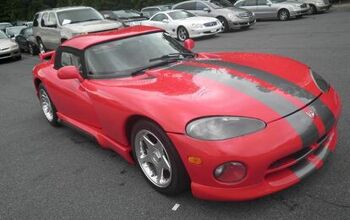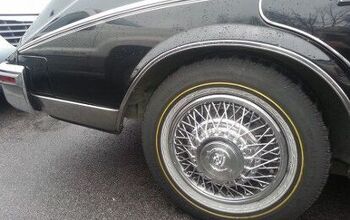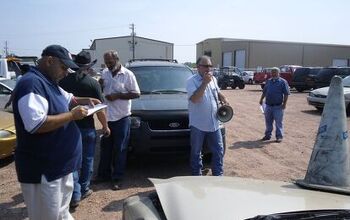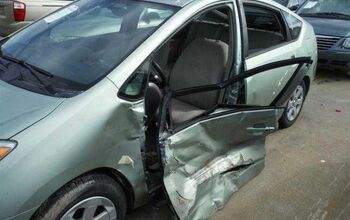Hammer Time: Keys
$2, $20, $200. $2000. Which one of the four would you like to pay? I always liked to opt for that simple $2 key. A crafted piece of metal cut to fit another crafted piece of metal. Turn the key for 20 years and enjoy a simple solution. But not everyone thinks that way.
Certain manufacturers like to put little chips in their keys to prevent theft. GM has been a long time practitioner of this art. Ford began in earnest around 1998. How do I know about Fords? It’s an absolute pain to get chip keys for a Taurus these days. You have to bring the vehicle to the dealer and have them program it. If it’s older than a 2000 you’re doubly screwed. Ford’s key database is kaput for vehicles before Y2K, which means you better have a first name relationship with a local locksmith.
Toyota used to be the kings of simple… before they created Lexus. Then a lot of the cost DNA started to go into regular Toyota products. The $2 key that I used for my 1994 Toyota Camry is peanuts compared with the $100+ key/fob for my mom’s 2003 Toyota Camry. Yet that’s child’s play compared with the $700 key/fob combination for a 2005 Lexus LS430.
What’s the difference? Nothing except a couple of vague piece of anti-theft technology and a few clickers. I have yet to see any cost benefit study that justifies the dealer prices for a chip key and fob. Between losing a loyal customer and replacing cheap metal, silicon and plastic for a 60,000% profit, which one’s worth more?
The key is of course! Then there are the uber-keys. You lose a key to a Saab and you better be praying to St. Anthony, Patron Saint of Lost Things. Check out the discount prices for a pair of Saab keys. Most Saabs on the road now aren’t worth that much.
Bad Swedes have bad keys. Volvo keys of recent vintage also tend to be a bit on the pricier side. Most Volvo dealers will charge about $300 for two ounces worth of dealer serviced metal and plastic. Not bad at all for late model vehicles. Especially compared to the Saab. But keep in mind you can also buy about 3000 pounds worth of a scrapped Volvo 240 or 850at an impound sale for the same price… with a key.
One of my family members, more than likely the dog, misplaced the keys to a Mercedes S500 a year ago. I ended up in hock to Mercedes for $200 thanks to that cosmic screw up. Every six months or so I have to deal with this headache called lost keys. The $10 for an old Toyota or Chrysler doesn’t bother me at all. $100 for a Ford or Buick chip key bothers me a bit. Anything more and I’m ready to pray, and surprisingly it works most of the time. Just not for a Mercedes.
More by Steven Lang
Latest Car Reviews
Read moreLatest Product Reviews
Read moreRecent Comments
- 28-Cars-Later Actually Honda seems to have a brilliant mid to long term strategy which I can sum up in one word: tariffs.-BEV sales wane in the US, however they will sell in Europe (and sales will probably increase in Canada depending on how their government proceeds). -The EU Politburo and Canada concluded a trade treaty in 2017, and as of 2024 99% of all tariffs have been eliminated.-Trump in 2018 threatened a 25% tariff on European imported cars in the US and such rhetoric would likely come again should there be an actual election. -By building in Canada, product can still be sold in the US tariff free though USMCA/NAFTA II but it should allow Honda tariff free access to European markets.-However if the product were built in Marysville it could end up subject to tit-for-tat tariff depending on which junta is running the US in 2025. -Profitability on BEV has already been a variable to put it mildly, but to take on a 25% tariff to all of your product effectively shuts you out of that market.
- Lou_BC Actuality a very reasonable question.
- Lou_BC Peak rocket esthetic in those taillights (last photo)
- Lou_BC A pickup for most people would be a safe used car bet. Hard use/ abuse is relatively easy to spot and most people do not come close to using their full capabilities.
- Lorenzo People don't want EVs, they want inexpensive vehicles. EVs are not that. To paraphrase the philosopher Yogi Berra: If people don't wanna buy 'em, how you gonna stop 'em?


































Comments
Join the conversation
jimal the vw dealer(or audi) doesnt have a special machine to cut keys. Every VIN has one of 8 parts numbers for a key. There are 8 mass produced cutou A6 key isn't near $500 even with programming. If you need just the blade they are 80 plus prgramming if you need a whole key its like 170 plus programming.
See this http://www.newscientist.com/article/mg20827894.500-criminals-find-the-key-to-car-immobilisers.html the header reads Criminals find the key to car immobilisers 06 December 2010 by Duncan Graham-Rowe Magazine issue 2789. Subscribe and save For similar stories, visit the Crime and Forensics Topic Guide For 16 years, car immobilisers have kept car thieves at bay – but that may now be changing AFTER a 16-year decline, car theft in Germany rose in 2009, according to figures released recently by the German Insurance Association. One "white hat" hacker, who probes security systems to flag up flaws that can then be patched, thinks he knows why. Karsten Nohl of Security Research Labs in Berlin, Germany, has identified vulnerabilities in the engine immobilisers used to protect modern cars from theft.